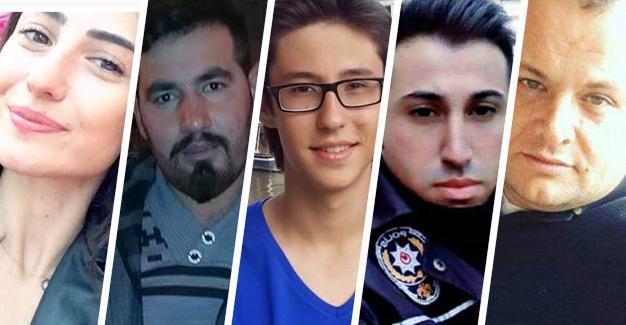Stories of people killed in Beşiktaş bombing begin to emerge
ISTANBUL

The police officers killed in the Dec. 10 terror attack in central Istanbul were not faceless uniforms but sons, brothers, fathers, U.K. Ambassador to Turkey Richard Moore said in a soulful tweet.
The same is true for the civilians killed.
As the country mourns the 44 people who lost their lives in the twin bombings near Istanbul’s Beşiktaş Vodafone Arena stadium, their personal stories proved once again that casualties are not just numbers.
Selin Çelik, 28, was on a minibus to Istanbul’s Taksim Avenue when the explosion happened. She was heavily wounded in the head before being rushed to hospital. Her family waited for her recovery and she received blood donations after a social media campaign went viral. However, she succumbed to her injuries despite all attempts to save her life.
“My cousin was in a minibus near the scene of the explosion. Her friends searched for her in all hospitals to find her after we couldn’t hear from her. Her friend recognized her from her tattoo,” Çelik’s cousin Tankurt Karamuk said.
She was the sister of Pelin Çelik, a master swimmer of the Galatasaray sports club.
Velat Demiroğlu was the driver of another minibus driving past the Vodafone Arena at the time of the explosion. Demiroğlu was from southeastern province of Diyarbakır’s Çınar district, and his Facebook profile had a photo of the Oct. 10, 2015 Ankara bombing calling for peace and saying: “Whatever its view, whatever its justification, we don’t want death. No cause is more important than human life.”
Mustafa Berkay Akbaş, only 19, originally from the Black Sea province of Sinop, was in Istanbul for a two-day visit. He was a medical student in Ankara’s Başkent University.
“He was 19 years old. He was in Istanbul for only two days. He and his friends were there to travel around. They were in a taxi, passing by the area at the time by coincidence,” his father said after his son was killed in the attack.
“He is being called a martyr because of this. I don’t want my son to be a martyr. He was slaughtered. His wish was to become a doctor and help people. Terror cannot end only by condemnation. We’ve been condemning it for years,” he added.
Adem Oğuz, from the southern province of Adana, was a police officer assigned to duty in Beşiktaş on the day of the attack. He is survived by his wife and six-month-old son.
Soner İdil, from the eastern province of Van, was also a police officer assigned to the area, and started his job three months ago. His father said he couldn’t get through to his son after hearing about the attack.
“We are raising our lions for our country. He died for his country. I hope he will go to heaven. The last time I spoke to him on the phone, he said ‘Father, we are going to work at the game. I’ll call you later.’ Then he called and we spoke. But I couldn’t get through to him after 9 p.m.,” his father Miktad İdil said.
Vefa Karakurdu, a police officer in charge of match security, was known for his love for Beşiktaş and was killed in the attack outside the club’s stadium.
“My manager would die for Beşiktaş. Everything was Beşiktaş for him. He went wherever Beşiktaş went,” said one of Karakurdu’s colleagues.
 The police officers killed in the Dec. 10 terror attack in central Istanbul were not faceless uniforms but sons, brothers, fathers, U.K. Ambassador to Turkey Richard Moore said in a soulful tweet.
The police officers killed in the Dec. 10 terror attack in central Istanbul were not faceless uniforms but sons, brothers, fathers, U.K. Ambassador to Turkey Richard Moore said in a soulful tweet.